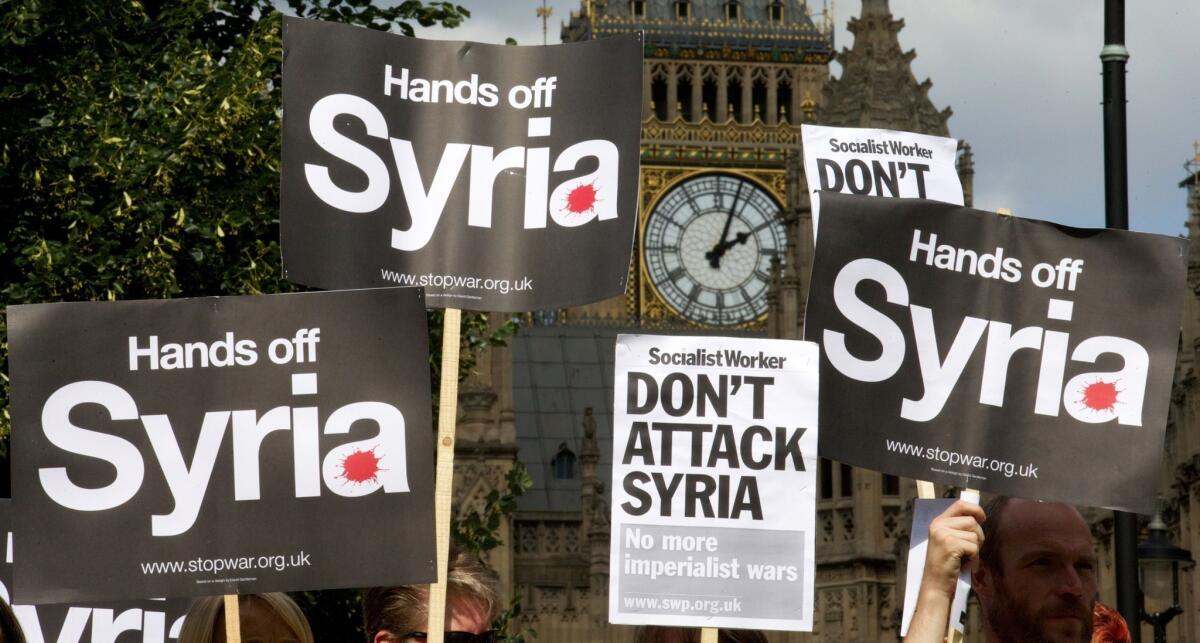Syria strike justified on humanitarian grounds, Britain’s Cameron says

- Share via
LONDON -- As lawmakers prepared to debate their response to alleged chemical weapons attacks by the Syrian regime, the British government laid out its arguments Thursday for the legality of military intervention “as an exceptional measure on grounds of overwhelming humanitarian necessity.”
Prime Minister David Cameron’s office said the aim of striking specific targets within Syria would be to deter President Bashar Assad’s regime from launching further chemical attacks and to alleviate human suffering. Any military operation would be confined solely to that objective and to a limited amount of time, officials said.
Also Thursday, the British government’s Joint Intelligence Committee released a memo calling it “highly likely” that Assad’s forces were behind a suspected major chemical attack in eastern Damascus last week. It said evidence from many sources supported that conclusion, but it expressed puzzlement as to “the regime’s precise motivation for carrying out an attack of this scale at this time.”
The Obama administration is expected to release its own explanation for concluding that Assad gassed rebel-held neighborhoods.
Cameron has been one of the most vocal advocates of punishing the Syrian regime and has introduced a resolution at the U.N. Security Council to authorize it. Chances that the resolution will pass are slim in the face of Russian and Chinese opposition.
He is now confronted with serious reservations at home as well, with the opposition Labor Party and some of his fellow Conservatives demanding that he slow down the pace toward military intervention and wait for a report from U.N. weapons inspectors before making a decision. Many Britons are leery of striking Syria after watching their country go to war in Iraq based on false claims of weapons of mass destruction there.
Under increasing pressure from skeptics, Cameron was forced to pull back Wednesday night from putting forward a motion in Parliament authorizing military intervention.
Instead, British lawmakers are to debate a watered-down government motion Thursday deploring the use of chemical weapons and endorsing military force as a legitimate response in principle. Any actual attack would be subject to another vote.
“I’m determined we learn the lessons of the past, including Iraq,” Labor Party leader Ed Miliband said. “And we can’t have the House of Commons being asked to write a blank check to the prime minister for military action.”
Cameron’s government has said that launching an attack on Syria would ideally be done with U.N. backing. But even without the world body’s blessing, British officials say, such intervention would comply with international law.
The argument released Thursday identifies the legal basis as allowable “humanitarian intervention” as long as certain conditions are met: that there is convincing evidence of a humanitarian catastrophe requiring immediate relief, that there is “no practicable alternative to the use of force if lives are to be saved,” and that any attack is limited in time and scope.
Separately, British defense officials said they were deploying six Typhoon fighter jets to Cyprus to protect Britain’s military base there.
ALSO:
Militants in Afghanistan launch attacks against NATO
Iran still progressing on its nuclear program, U.N. says
Russian resistance torpedoes United Nations resolution on Syria
More to Read
Sign up for Essential California
The most important California stories and recommendations in your inbox every morning.
You may occasionally receive promotional content from the Los Angeles Times.













